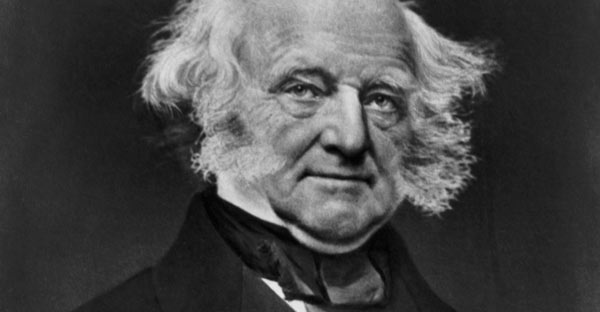Martin Van Buren |
|||||
 |
|||||
Martin Van Buren was born on December 5, 1782, in Kinderhook, New York. Van Buren’s parents were Dutch farmers and taught him the Dutch language before he learned English. He attended school at a village schoolhouse until the age of 14. At the age of 16, however, Van Buren began studying law at the office of prominent Kinderhook attorneys. By 1803, Van Buren was admitted to the New York State Bar at the age of 21. In 1807, Van Buren married Hannah Hoes, his first cousin once removed. Hoes was raised in a Dutch home and spoke English with a strong accent. The Van Buren’s would eventually have five sons, four of which survived into adulthood. In 1819, Hannah died of tuberculosis. Martin would never re-marry. Van Buren’s family had been involved in politics from the time he was a child, and Martin became involved shortly after becoming an attorney. In 1815, he was elected Attorney General (top legal official) for the State of New York while serving in the state’s senate, where he fought for increased soldier pay and expansion of New York’s militia. He soon gained political influence and was nicknamed “the Little Magician” for his skill in ensuring his political supporters were awarded government jobs and incentives for remaining loyal. This practice was known as “the spoils system,” and became an accepted aspect of politics. Van Buren’s political cronies would eventually organize themselves into the Democratic Party. Van Buren served as senator of New York from 1821 to 1829. In 1829, he was elected as governor of New York. Van Buren’s term as governor was the shortest in the history of the state, largely because newly elected president Andrew Jackson appointed him as Secretary of State on March 5, 1829. In 1831, he strategically resigned as Secretary of State in the wake of the Petticoat Affair, in which members of Andrew Jackson’s cabinet and wives refused to associate with Secretary of War John Eaton and his wife because of disapproval over the circumstances of their marriage. Jackson, however, was fond of Van Buren, and appointed him as his vice-presidential running mate in the Election of 1832. When Jackson was elected president, Van Buren became his vice-president. As vice-president, Van Buren was one of Jackson’s most trusted advisors and stood by Jackson in contentious issues such as the Nullification Crisis of 1828, in which South Carolina attempted to void a federal tariff that it claimed hurt its economy and favored the North. In 1837, with Jackson’s support, Van Buren was elected as America’s eighth president. During his presidency, Van Buren was tasked with dealing with the Panic of 1837, a financial crisis that resulted in five years of economic depression. Like his predecessor, Andrew Jackson, Van Buren supported measures to remove Native Americans from their lands to reservations in Oklahoma. Throughout his presidency and after, Van Buren opposed the abolishment of slavery, even though he believed the practice to be immoral. Van Buren would be blamed for the country’s precarious economic position and was defeated by William Henry Harrison in the presidential election of 1840. Although Van Buren sought to return to the White House, political missteps cost him any real chance of election. Van Buren died on July 24, 1862, at the age of 79. |
|||||